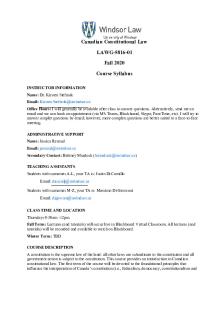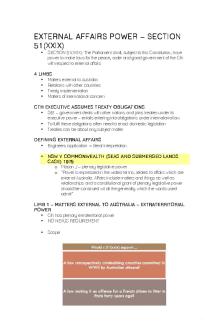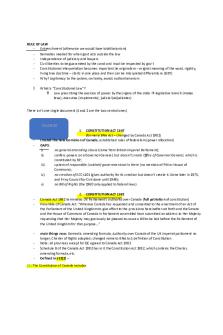Week 5- Constitutional Law PDF

| Title | Week 5- Constitutional Law |
|---|---|
| Author | Stephanie Kok |
| Course | Constitutional Law |
| Institution | University of New England (Australia) |
| Pages | 44 |
| File Size | 1.1 MB |
| File Type | |
| Total Downloads | 101 |
| Total Views | 138 |
Summary
Notes for Lectures (Inclusive of readings and personal notes)...
Description
Table of Contents Week 5 – Part 1: The Taxation Power..................................................................................3 Relevant Legislation.....................................................................................................................3 S51(ii) CTH Constitution: The Taxation Power...............................................................................3 S90 CTH Constitution: Excise Exclusive to CTH..............................................................................3 S99 CTH Constitution: Non-Discrimination Clause in Trade, Commerce and Revenue..................3 S53 CTH Constitution: Money Bills Requirements.........................................................................3 S55 CTH Constitution....................................................................................................................4 Taxation Power: S51(ii) – How can it be used?..............................................................................5 Categories where the Term in Question is NOT a tax....................................................................5 What is a Tax – Definition, Expansions of Definitions...................................................................6 Reason: If Litigants do not want to pay Taxes............................................................................................6
If you Prove the Item is a Tax........................................................................................................6 If you Prove Item is Not a Tax........................................................................................................6 Cases where the Item in Question was Held to be a Tax:..........................................................................6 Matthews v Chicory Marketing Board (1938) 60 CLR 263 – sets out classic definition of a ‘tax’ for the purposes of characterizing federal laws....................................................................................................6 Air Caledonie v Commonwealth (1988) 165 CLR 462 –For a payment/fee for services rendered to be considered a tax – It needs to be ‘a charge exacted for particular identified services provided or rendered individually to, or at the request or direction of, the particular person required to make the payment.’...................................................................................................................................................6 Australian Tape Manufacturers Association Ltd v Commonwealth (1993) 176 CLR 480..........................8 Northern Suburbs General Cemetery Reserve Trust v Commonwealth (1993) 176 CLR 555 – negative attributes of taxation: Requirement to make employers pay on employment training was not a penalty, as there was no offence provision or mandate conduct, it merely incentivized conduct.........................9 Luton v Lessels (2002) 210 CLR 333 – proposition that paying into consolidated revenue is not necessarily determinative of Taxation. Court will look beyond the label to look at the substance and characterization of the arrangements.....................................................................................................10 Roy Morgan Research Limited v Federal Commissioner of Taxation (2011) 244 CLR 97 – Modern Summary of what constitutes a tax (would fall under s51(ii))................................................................11 Queanbeyan City Council v Actew Corporation Ltd (2011) 281 ALR 671 – fees imposed by a government on a government-owned corporation were not a tax but an "internal financial arrangement"...........................................................................................................................................13
Fee for Service............................................................................................................................14 Air Caledonie international v Commonwealth (1988) 165 CLR 462 – a fee is a tax if there is no discernible relationship between the amount paid and the ‘service’ or ‘privilege’ received.................14 Air services Australia v Canadian Airlines International Limited (1999) 202 CLR 133 – relaxes the ratio in Air Caledonie – no need for a strict discernible relationship between the amount paid by an individual to a provider of services which are legally/practically compulsory so long as the amount paid fairly reflects a bona fide attempt by provider to recover costs.....................................................15
Arbitrary Exaction and Incontestable Impost..............................................................................17 MacCormick v Federal Commissioner of Taxation (1984) 158 CLR 622 – proposition that an arbitrary exaction is not a tax.................................................................................................................................17 Deputy Federal Commissioner of Taxation v Truhold Benefit Pty Ltd (1988) 158 CLR 678.....................18 Austin v Commonwealth (2003) 215 CLR 185.........................................................................................19
Incidental Aspect of Tax Power...................................................................................................20 Pape v Commissioner of Taxation (2009) 238 CLR 1................................................................................20
Part 2 – Appropriations Power..........................................................................................21 Relevant Legislation...................................................................................................................21 S81 CTH Constitution (Process of Appropriation).......................................................................21 S83 CTH Constitution..................................................................................................................21
1
S53 CTH Constitution..................................................................................................................22 S54 CTH Constitution..................................................................................................................22 Effect of Legislation:....................................................................................................................22 Attorney- General (Vic); Ex Rel Dale v Commonwealth (First Pharmaceutical Benefits Case) (1945) 71 CLR 237....................................................................................................................................................22 Victoria v Commonwealth and Hayden (AAP Case) (1975) 134 CLR 338................................................24 Pape v Commissioner of Taxation (2009) 238 CLR 1 – While appropriation is a necessary precondition for expenditure, the expenditure or it activities will not be valid unless supported by another source of power, other than s81.............................................................................................................................27 Williams v Commonwealth (School Chaplains Case) (2012) 288 ALR 410 (Williams No 1) – reaffirmed Pape in holding that making an appropriation under s81 is not sufficient to confer validity on proposed expenditure..............................................................................................................................................28 Williams v Commonwealth (2014) 309 ALR 41 (Williams No 2) – reaffirmed Pape................................28 Wilkie v Commonwealth [2017] HC 40....................................................................................................29
Part 3 – S96 Grants Power................................................................................................32 S96 CTH Constitution..................................................................................................................32 Victoria v Commonwealth (Roads Case) (1926) 38 CLR 399...................................................................32 Deputy Commissioner of Taxation (NSW) v WR Moran Pty Ltd (1939) 61 CLR 735 (High Court) – S96 is immune from the requirement in s99.....................................................................................................33 WR Moran Pty Ltd v Deputy Commissioner of Taxation for New South Wales [1940] AC 838 – affirmed HC’s decision............................................................................................................................................34 South Australia v Commonwealth (First Uniform Tax Case) (1942) 65 CLR 373 – affirmed the CTH’s dominance within the Federal system.....................................................................................................34 **Victoria v Commonwealth (Second Uniform Tax Case) (1957) 99 CLR 575.........................................36 Attorney General (Vic); Ex rel Black v Commonwealth (DOGS Case) (1981) 146 CLR 559......................37 PJ Magennis Pty Ltd v Commonwealth (1949) 80 CLR 382 – considered the use of s96 and its relationship with another constitutional prohibition on CTH power......................................................38 Pye v Renshaw (1951) 84 CLR 58 – dismissed any argument that s51(xxxi) posed a limit to s96 itself.. 39 IGM Agriculture Pty Ltd and Others v Commonwealth (2009) 240 CLR 140...........................................39 Spencer v Commonwealth (2010) 269 ALR 233 - Land clearing and the restrictions on land clearing imposed on carbon emissions and environmental considerations.........................................................41 Spencer v Commonwealth [2015] FCA 754.............................................................................................42
Overall Analysis on S96:.............................................................................................................43
2
Week 5 – Part 1: The Taxation Power Relevant Legislation S51(ii) CTH Constitution: The Taxation Power The Parliament shall, subject to this Constitution, have power to make laws for the peace, order and good government of the Commonwealth with respect to: TAXATION; but so as not to discriminate between States or parts of States S51(ii) grants the CTH the power to legislate with respect to ‘taxation’. It uses this power to raise the greater part of its revenue, most obviously by income taxation and taxes on goods and services. The power of taxation is expressly limited by the requirement that it not be used to ‘discriminate between States or parts of States’. On the other hand, the power to distribute the resulting revenues is not so limited. S90 CTH Constitution: Excise Exclusive to CTH On the imposition of uniform duties of customs the power of the Parliament to impose duties of customs and excise, and to grant bounties on the production or export of goods, shall become exclusive. Note: Customs and excise are taxes that used to be levied at the colonial boundaries on goods and services transitioning those boundaries. But at the institution of the CTH in 1901, the CTH took over those powers. Excise is a form of taxation, if it’s an excise, it is exclusively within the boundaries of CTH jurisdiction under s90 of the CTH Constitution. S99 CTH Constitution: Non-Discrimination Clause in Trade, Commerce and Revenue The Commonwealth shall not, by any law or regulation of trade, commerce or revenue, give preference to one State or any part thereof over another State or any part thereof
3
To ensure trade crossing trade boundaries couldn’t be taxed. Can’t preference states against states or parts of states against other parts of states.
S53 CTH Constitution: Money Bills Requirements Proposed laws appropriating revenue or moneys, or imposing taxation, shall not originate in the Senate… The Senate may not amend proposed laws imposing taxation, or proposed laws appropriating revenue or moneys for ordinary annual services of government The Senate may not amend any proposed law so as to increase any proposed charge or burden on the people This section talks about how taxation legislation is set up. Senate have different powers in relation to money bills. The limitations on the Senate reflects the constitution convention that you will need to command the majority of votes in the lower house to hold government and a major part of government is to be able to pass supply bills and impose taxation. Note: Because it refers only to ‘proposed laws’ and therefore to the internal workings of the federal Parliament, the HC has held that s53 is not justiciable – that is, it is not appropriate for adjudication by a court. This view has repeatedly been confirmed in Western Australia v Commonwealth (native Title Act Case) (1995) and Permanent Trustee Australia Ltd v Commissioner of State revenue (2004). S55 CTH Constitution Laws imposing taxation shall deal only with the imposition of taxation and any provision therein dealing with any other matter shall be of no effect Laws imposing taxation, except laws imposing duties of customs and excise, shall deal with one subject of taxation only; but laws imposing duties of customs shall deal with duties of customs only, and laws imposing duties of excise shall deal with duties of excise only Analysis: No overlap here. This sets up a regime where you need a taxation act that actually imposes the tax and other provisions relating to that tax have to be put in a separate administration act (2 pieces of legislation). Another restraint: Laws imposing taxation shall deal with only one subject of taxation – this is designed to ensure structural supremacy in economic matters of the lower house and to ensure that it matches with the conventions of the Westminster government (government has to hold the majority in the lower house), and the Senate is not a place where taxation/money bills are to be introduced. Note: Osborne v CTH took the opposite view in relation to the first paragraph of s55, which requires that laws imposing taxation shall deal only with the imposition of taxation, and that any provision dealing with other matters ‘shall be of no effect’.
4
This provision was said to be justiciable because the reference is to ‘laws’ rather than ‘proposed laws’, and because the words ‘shall be of no effect’ prescribe a precise legal consequence of breach. Despite the absence of these indicia, a similar conclusion has been extended to the 2nd para of s55 (ie. ...shall deal with one subject taxation only’) in State Chamber of Commerce and Industry v CTH. However, challenges to legislation on this ground have regularly failed, since the concept of a ‘subject of taxation’ has been very loosely applied. As Dixon J explained in Resch v Federal Commissioner of Taxation (1942), the purpose of s55 is political rather than legal: and accordingly, the expression ‘subject of taxation’ ‘must be taken as contemplating broad distinctions between possible subjects of taxation based on common understanding and general conceptions, rather than on any analytical or logical classification’. The ‘main or substantial subject of the tax’ is to be ‘gathered from a general consideration’ of the impugned legislation, bearing in mind ‘that it is for the legislature to choose its own subject and that its choice is fettered neither by existing nomenclature nor by categories that have been adopted for other purposes’. The purpose of section 55 is to protect the Senate against exploitation of its inability to amend a proposed law imposing taxation. There are three distinguishable situations. The first, and most straightforward, is where a new Act deals with both the imposition of taxation and other matters section 55 will operate to confine validity to the imposition of taxation provisions. In the second situation an amending Act inserts tax imposition provisions into an existing Act. The third situation is where an amending Act includes both tax imposition and other provisions.
Taxation Power: S51(ii) – How can it be used?
Taxation Power arises when corporations are disputing that the ‘item’ is a tax that falls within the purview of the CTH’s powers. The central question arising in relation to s51(ii) is: ‘What is a tax?’. If an exaction is a tax, then the law that imposes it can be characterized as a law with respect to the subject matter of s51(ii). Because some constitutional limitations hinge on the existence of a tax (for eg, ss90 and 114) cases defining the term can arise in litigation not concerned with s51(ii). o In proving that the item is a tax, it has to comply with ss 53, 55, 99 of Constitution – may be grounds for Constitutional challenge for non compliance and hence invalidity o If prove item is not a tax, then it will lack constitutional support from s.51 (ii) and to be a valid law, will need to be supported by a separate head of constitutional power, perhaps in its incidental aspect of that head of power To raise revenue As instrument of economic and social control – to achieve objects outside of the textual provisions of CTH constitutional power (for eg, the CTH may be able to use the taxation power to achieve indirectly what it cannot achieve directly ie. to deter smoking, etc.).
Categories where the Term in Question is NOT a tax
Charge for the acquisition or use of property 5
Fee for a privilege Penalty for criminal conduct or breach of statutory obligation Fee for service Arbitrary exaction Incontestable impost Internal financial arrangements of government
If it is not a tax (as above), it cannot be supported by s51(ii) of the Constitution. In this case, it will then be needed to be supported by another head of CTH power or be incidental to the other head of CTH power. (See Roy Morgan case: Usual Description of a tax to identify what a tax is, for which the above categories will not fall into).
What is a Tax – Definition, Expansions of Definitions Reason: If Litigants do not want to pay Taxes. If you Prove the Item is a Tax Item needs to comply with ss53, 55, 99 of Constitution – this may be grounds for Constitutional challenge for non-compliance which will result in invalidity. If you Prove Item is Not a Tax It will lack constitutional support from s51(ii) and to be a valid law, will then need to be supported by a separate head of constitutional power, perhaps even in its incidental aspect of that head of power Cases where the Item in Question was Held to be a Tax: Matthews Parton Air Caledonie Homebush MacCormick Truhold Australian Tape Manufacturers Northern Suburbs General Cemetery Reserve Trust Matthews v Chicory Marketing Board (1938) 60 CLR 263 – sets out classic definition of a ‘tax’ for the purposes of characterizing federal laws. The key question was whether a Victorian levy on producers of chicory was an excise duty, in which event it infringed s90 of the Constitution; and since an excise is a form of taxation (loosely, a tax on goods), as it was necessary first to determine whether the levy was a ‘tax’. In answering this question about a State levy, Latham CJ laid down what has become the classic definition of a ‘tax’ for the purposes of characterizing federal laws.
6
Citing Lower Mainland Dairy Products Sales Adjustment Committee v Crystal Dairy Ltd, he held that a tax ‘is a compulsory exaction of money by a public authority for public purposes, enforceable by law, and is not a payment for services rendered’.
Air Caledonie v Commonwealth (1988) 165 CLR 462 –For a payment/fee for services rendered to be considered a tax – It needs to be ‘a charge exacted for particular identified services provided or rendered individually to, or at the request or direction of, the particular person required to make the payment.’ Definition in Matthews (above)while useful is not exhaustive, the Court unanimously acknowledged that Latham CJ’s definition required elaboration. Attributes highlighted in Matthews are not compulsory fea...
Similar Free PDFs

Week 5- Constitutional Law
- 44 Pages

Constitutional Law
- 5 Pages

Constitutional law syllabus
- 13 Pages

Citizenship Constitutional Law Notes
- 10 Pages

Constitutional-Law-Flowchart
- 8 Pages

Constitutional Law model questions
- 42 Pages

Constitutional Law 4 limbs
- 7 Pages

Constitutional Law 1- Bernas
- 1,442 Pages

Constitutional Law Reviewer
- 227 Pages

Constitutional Law Reviewer midterm
- 161 Pages

Australian Constitutional Law Notes
- 65 Pages

Constitutional LAW Outline
- 73 Pages

LS1537 - UK Constitutional Law
- 6 Pages

Constitutional Law Outline
- 30 Pages
Popular Institutions
- Tinajero National High School - Annex
- Politeknik Caltex Riau
- Yokohama City University
- SGT University
- University of Al-Qadisiyah
- Divine Word College of Vigan
- Techniek College Rotterdam
- Universidade de Santiago
- Universiti Teknologi MARA Cawangan Johor Kampus Pasir Gudang
- Poltekkes Kemenkes Yogyakarta
- Baguio City National High School
- Colegio san marcos
- preparatoria uno
- Centro de Bachillerato Tecnológico Industrial y de Servicios No. 107
- Dalian Maritime University
- Quang Trung Secondary School
- Colegio Tecnológico en Informática
- Corporación Regional de Educación Superior
- Grupo CEDVA
- Dar Al Uloom University
- Centro de Estudios Preuniversitarios de la Universidad Nacional de Ingeniería
- 上智大学
- Aakash International School, Nuna Majara
- San Felipe Neri Catholic School
- Kang Chiao International School - New Taipei City
- Misamis Occidental National High School
- Institución Educativa Escuela Normal Juan Ladrilleros
- Kolehiyo ng Pantukan
- Batanes State College
- Instituto Continental
- Sekolah Menengah Kejuruan Kesehatan Kaltara (Tarakan)
- Colegio de La Inmaculada Concepcion - Cebu

